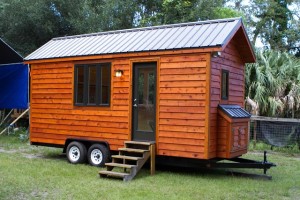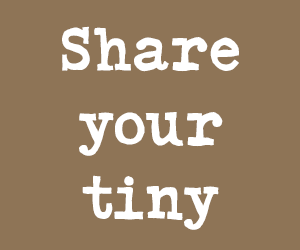This post contains affiliate links.
Like so many parents, Laura and Matt were working too hard to try and keep up with their $2,000/month mortgage and all their other bills on the dream home they built. But unlike many people, they sold the home and bought and renovated a bus so they could travel and appreciate minimalism!
They’ve been travelling (except during the shut-down) for just over a year now, and have plans to finish their round-Australia road trip once everything opens up again. Their bus includes three beds, a kitchen with an oven, and even a hide-away toilet (watch the video tour to find it!).
The couple told us they do have plans in the next year or so to purchase land where they can build a tiny house and have some roots, a washing machine, and a warm bath, but it doesn’t sound like they’re ever going back to “normal” life. Don’t miss our Q&A with them at the end of the post!
Don’t miss other interesting tiny homes – join our FREE Tiny House Newsletter for more!
From “Dream Home” to Bus Home: Family of 4

Images via @theavocadotribe/Instagram
Love how they creatively made three separate beds.

Images via @theavocadotribe/Instagram
They actually just recently updated the bus, after 8 months of living in it, to fit their needs.
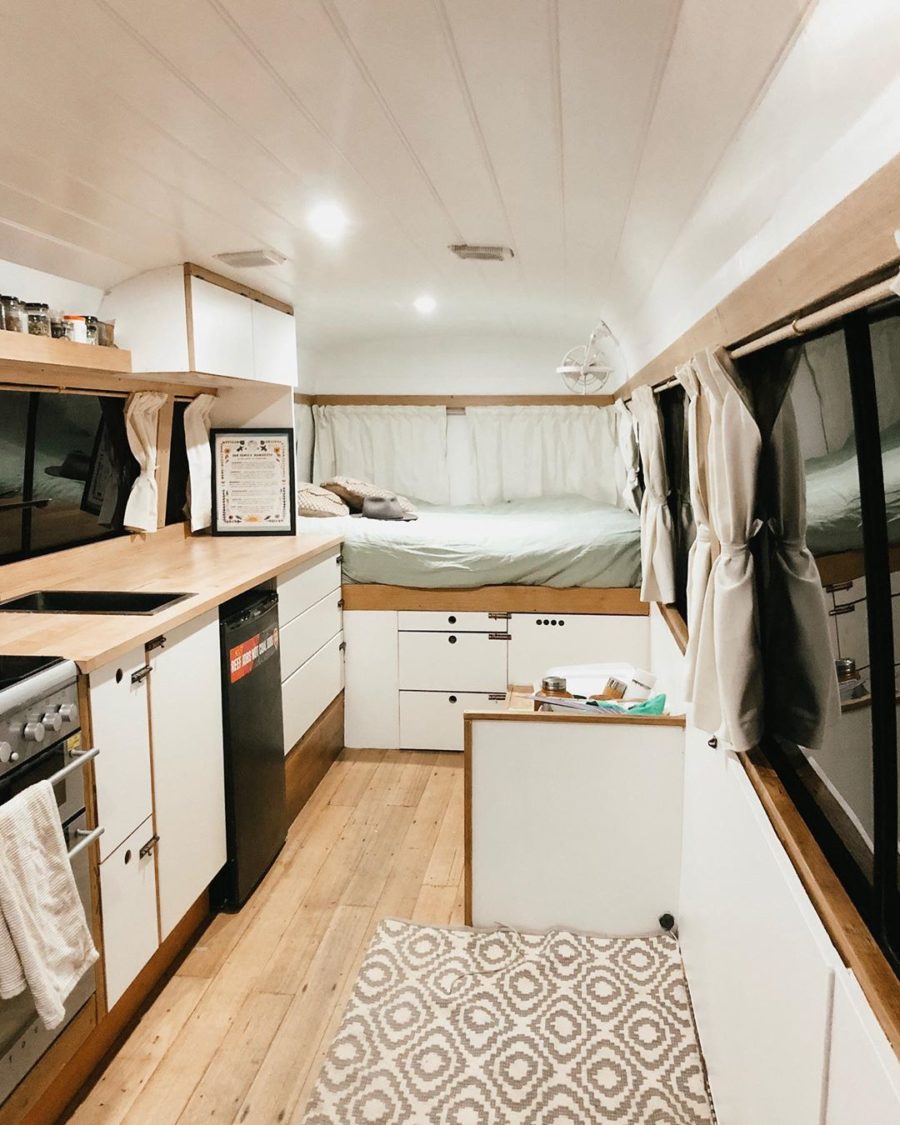
Images via @theavocadotribe/Instagram
Queen bed in the back, with storage underneath.
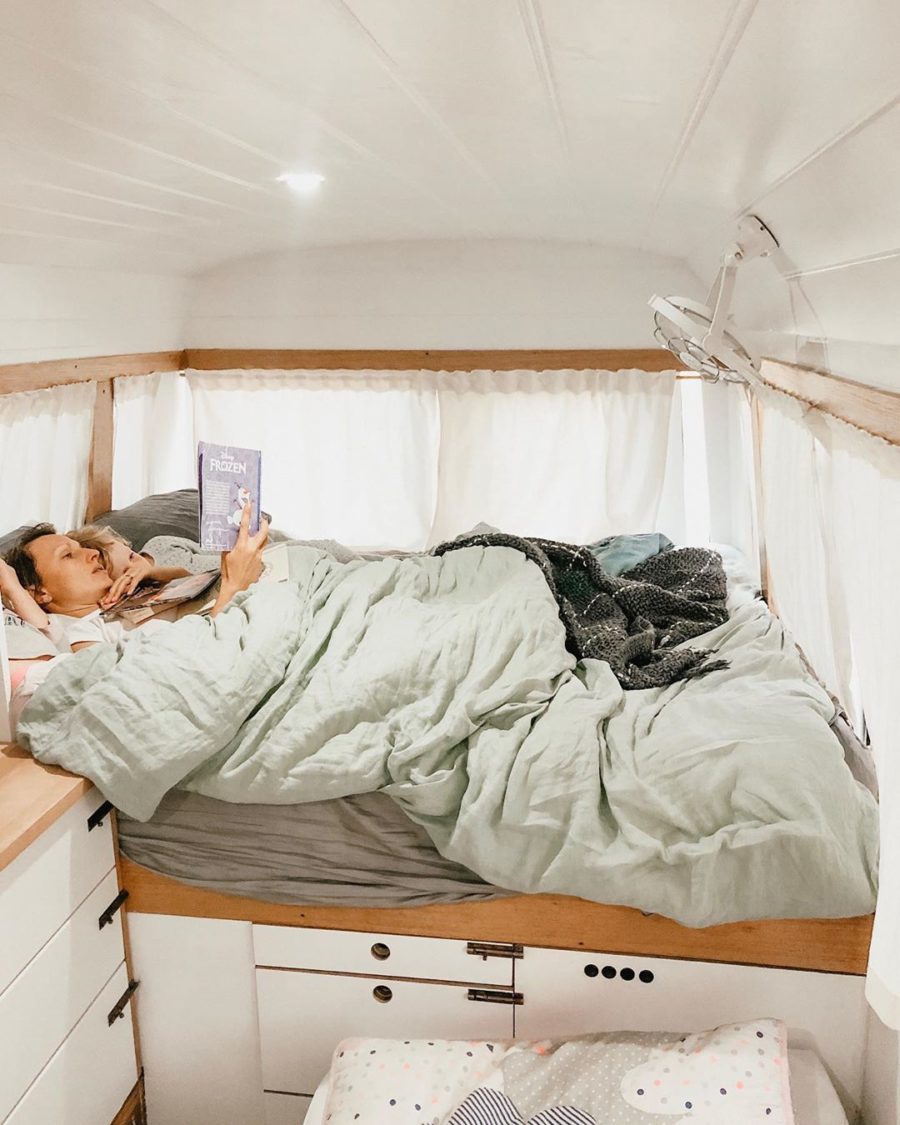
Images via @theavocadotribe/Instagram
More counter space for cooking meals.
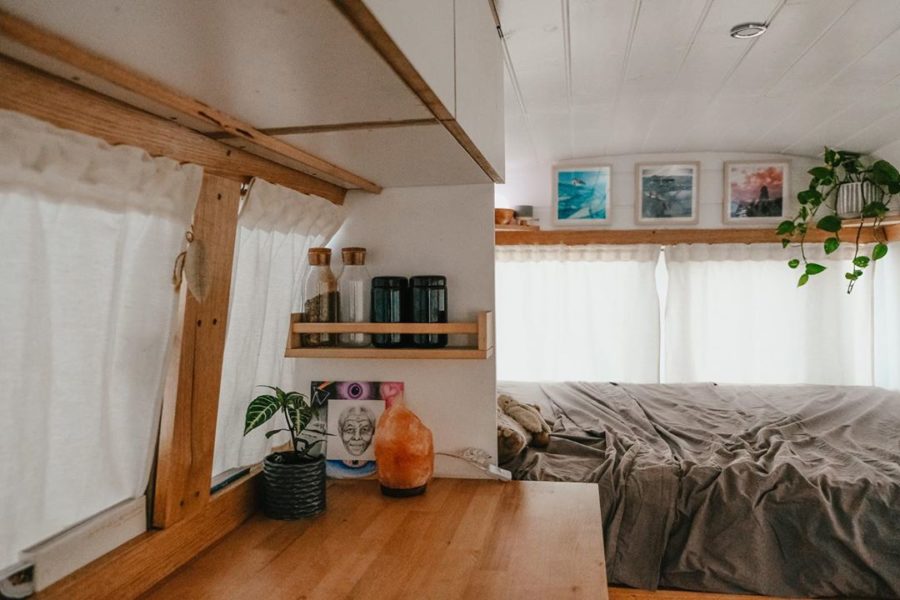
Images via @theavocadotribe/Instagram
Watch the video tour below to see more!
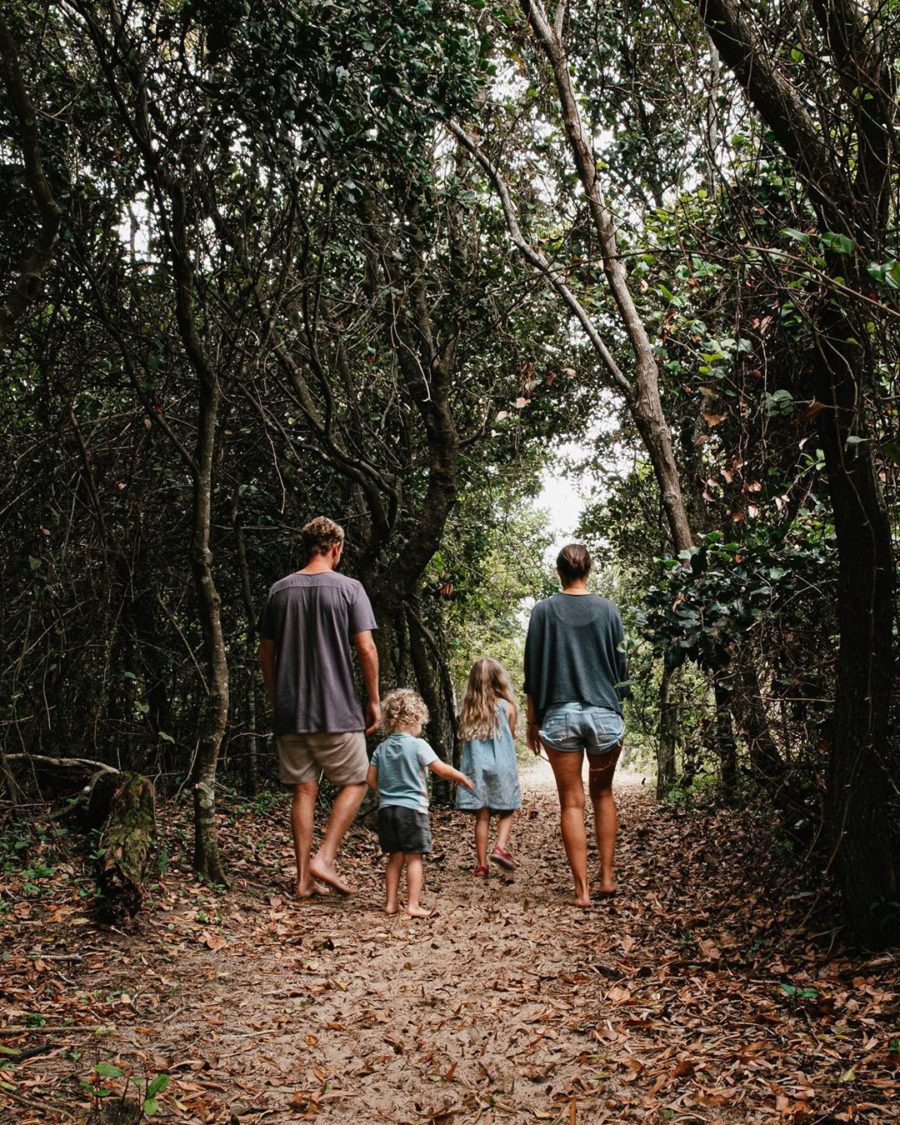
Images via @theavocadotribe/Instagram
Q&A with Laura: Family Bus Life
What are your name(s)? Laura, Matt, Frankie (6) and Myles (3)
How many people (and animals) are living in your bus? 2 adults and 2 children. No fur babies yet.
Where do you live? How long have you lived tiny? We are currently parked at a friend’s place in Dudley NSW living in our self-converted bus. Our plan is to head up the East Coast of Australia then head west exploring NT and WA over the next 6 months. We have been travelling Australia in our tiny home on wheels since April 2019.
What do you do for work? Or do you travel full-time? We are currently travelling full time working on our own elixir product range (my passion as a food technologist) and building an online business to support the rest of our travels and set us up for when we decide to settle. Initially when we first set off last year we had decided to take a consultancy job creating a plant-based café in Newcastle. We also worked a little here and there along our travels, which include: Matt renovating kitchens for 3 weeks, a small gig on ABC, taking photographs for a caravan park and working at a wellness centre.
Why did you decide to go tiny? What are you hoping to get out of living tiny? In 2016 just after Myles was born we realised the stress and anxiety from our mortgage, debts, bills, working tirelessly in our plant-based café and trying to juggle family life was wearing all of us down. In a way, we were forced to sell our ‘dream’ home we had only built two years prior yet it became the push we needed to start detaching ourselves from all of our ‘stuff’ we thought we needed and a motivation to create the minimalistic life we wanted for us as a family.
Going tiny, we wanted to go back to appreciating everything we had in our life, feeling grateful for the abundance that you can see beyond materialistic ‘stuff’. It also meant we could fulfil our dream to travel Australia as family, creating adventurous memories together while learning about the land we live on.
Why specifically did you choose a bus (instead of say an RV/van/tiny house on wheels)? Originally, we had a Toyota Land Cruiser 4wd and went looking for caravans to do the lap of Australia. I think the decision came down to two things, finance and getting to create and build exactly what we wanted with the up cycled materials we wanted to use. We sold our Land Cruiser which paid for our 2005 Mitsubishi Rosa (25-seater) and the whole renovation. Since being on the road we have loved having our home and everything we own wherever we go. We can park anywhere and make lunch, have a nap, use the toilet, retreat when its wet. We are also able to do a lot more stealth free camping too in a bus vs caravan and get around towns/park a little easier.
How did you first learn about bus life? The van life seed was first planted when we first met in 2009. Matt had decked out his Toyota Hiace work van with a bed and a fridge. Most weekends, as a childless carefree couple, we would take off on adventures along the coastline of Victoria to find waves. Exploring, surfing and simple living was what we loved.
How long did it take to finish your bus? We purchased a 2005 Mitsubishi Rosa at an auction site and after picking up our bus we had a deadline to meet for a work commitment. Matt completed the build within 10 weeks working on the bus full time and learning as he went. We did spend another month a year on changing the layout and renovating to create extra space, better finishing’s and getting it to feel more homely.
How did you build your bus? Did you have any help? Did you do it yourselves? Matt with no tradie experience, set about learning from YouTube and friends. He did mostly everything from the build, electrical, plumbing, mechanical by himself. He had friends come and help with the initial set up for the electrical and plumbing.
The bonus to do it for yourself is when anything does breakdown or stop working you know how to fix it or have a good idea of where to find the solution. We had a few times where our water pump went or our electrical system stopped and Matt knew how to solve the problems.
Are you comfortable sharing how much your tiny home cost? What are bills/utilities like compared to before? All up we have spent around $35k on our bus including the purchase and the build. Our money stretches so far now as our only expenses are fuel, groceries, phones, and a couple of subscriptions. We are completely off-grid so there are no bills. We try and free camp most of the time so there’s also a little that goes into caravan park / national park fees too. I would say we can comfortably live off $500/week when we aren’t travelling long distances verses before where our mortgage alone was nearly $2000/month.
How did you find a place to park and live in your bus? As we travel we look on wikicamps for free camps / national parks or people’s property who you pay a fee. We have been fortunate enough along our travels to stay with plenty of friends and family and also get great recommendations from other travellers and bus life families on best camp spots/caravan parks or areas to stay.
Before going tiny, what was life like? Busy, hectic, stressful and the feeling of always trying to get on top of everything whether that be the washing, cleaning, paying bills, managing staff. We were certainly in the cycle of working harder to live the life we ‘thought’ we wanted in our new house.
Is there anything from your old life that you miss? We certainly miss space. That separate room to meditate, journal or work without distractions. And having a piece of land that we can call our own, being able to feel grounded, building a veg garden or letting the kids roam wild. I do miss the constant community and a washing machine and a warm bath too.
What benefits are you experiencing after going tiny? Since living tiny we are experiencing the life we wanted for us as a family, creating adventurous memories together and getting to watch them grow into their own beings. It’s also allowed us the freedom to explore and learn about our beautiful country and the indigenous culture. Even simple actions like collecting wood and making a fire make us appreciate this lifestyle. We have met some incredible humans and seen some incredible places. We now have a greater understanding for the purpose and meaning behind everything we have in our life.
What’s it like living in a bus with children? Any particular difficulties or benefits? There is no escape when emotions need to come out in a small space. Settling into a routine gave some stability for the kids (emotions) and structure for the family. I think our most challenging part as a family has been to find that balance between experiencing everything together and allowing each other space. We all get FOMO! We’ve also found it hard to maintain our own daily habits / exercise mindful practices as our environment is constantly changing. A big benefit is the ease of cleaning. It takes us around 15mins to put everything away and clean the bus. Mind you we may need to do this, two or more times a day to keep the bus in order.
What makes your bus special? It’s our home that was hand built by Matt. There’s something special when you design and create a home for your family and needs with your own hands. We have been able to use recycled materials and create a modern feel, maximising spaces in such a tiny area.
Is there anything you’d change about your bus now that you’ve been living it? We wouldn’t change anything right now (after doing renovations earlier this year) however we do have a current wish list for additions, like – outside awning, roof fan/skylight, lithium battery set up, outside shower.
Do you plan on living this tiny forever? If not, do you think this experience will make you live differently in the future? We feel this way of living has changed so much for us. Living in a bus is not forever but we now have dreams of building a 10-star energy rating tiny home on land near the coast in the not so distant future, possibly 6-12 months.
What helpful advice would you give to others interested in going tiny? If you are thinking about it do it. It’s life changing to let go of all the possessions and attachments you think you need. You feel so much lighter and freer which allows you to understand what’s really important in life.
Go and step inside as many tiny homes, buses, vans, motorhomes, caravans as you can to understand the space, layouts, what you like or dislike to start getting a picture of what you would like to create, build or buy. We saw loads of caravans and a few motorhomes but our first layout was created in my head and on paper and in the end, it didn’t quite work for us in reality. After living in it and then seeing other vans/bus whilst we travelled we understood exactly what we wanted.
Set up a wish list of everything you would like against a budget sheet. etc solar, hot water, toilet, queen bed, and then work towards the must have’s vs the wants.
Way up the costs to pay someone to build if you are working vs the time spent for you to learn and build it yourself away from working. It may work out more feasible to hire someone.
Pinterest and Instagram have so many beautiful bus/vanlife designs to get ideas and inspiration.
YouTube has so many tutorials to build a tiny home.
Anything is possible on any budget.
Learn More:
You can share this using the e-mail and social media re-share buttons below. Thanks!
If you enjoyed this you’ll LOVE our Free Daily Tiny House Newsletter with even more!
You can also join our Small House Newsletter!
Also, try our Tiny Houses For Sale Newsletter! Thank you!
More Like This: Tiny Houses | Bus Conversion | One Wild Ride with Lexi & Tyler: From Traveling to Homesteading in their Bus Conversion | Skoolie Bus Life with Teens (& A Huge Bathroom!) | Family of 4’s Passenger Bus Turned Home in Australia
See The Latest: Go Back Home to See Our Latest Tiny Houses
This post contains affiliate links.
Natalie C. McKee
Latest posts by Natalie C. McKee (see all)
- Hutchinson Island Cottage: 1,350 Sq. Ft. Vacation Home - April 20, 2024
- Fifth Wheel RV Life w/ Daughters - April 20, 2024
- 925 sq. ft. Outpost Plus by Den - April 20, 2024




